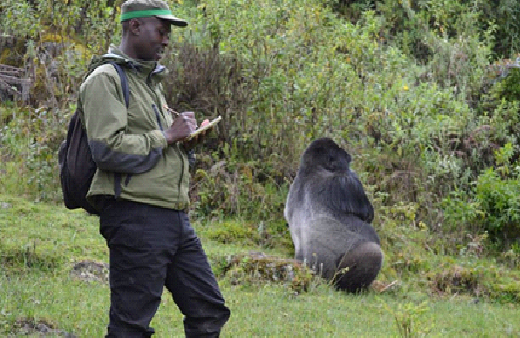2019- 2020 Anti-Encroachment Campaign around Volcanoes National Park
CONTEXT/BACKGROUND:

Fig 1: Map of Rwanda showing the targeted areas where ADEC will carry out and implement its conservation projects.

Figure 2: Adult female elephant peacefully walking across one of Rwanda’s National Parks, where ADEC will focus its efforts.
CHALLENGES:

Figure 3: Local communities, surrounding core areas around the Virunga National Park, are needed in order to continue to fight for conservation in Rwanda. ADEC’s conservation plan surrounds protecting and ensuring the future of Rwanda’s natural AND cultural heritage.
MAIN PROJECT OBJECTIVE:
The main objective of this project is to equip at least 600 ex-poachers with necessary skills to raise awareness among local communities on issues of conservation and ecotourism potential and cost-effectiveness.
SPECIFIC PROJECT OBJECTIVES:
⦁ To equip ex-poachers and local communities with skills so that they can combat the consequences of poor, natural resourcemanagement
⦁ To educatelocal communities with knowledge surrounding the consequences of over-exploiting and harvesting existing resources
⦁ To incorporate alternative sources of socio-economic development into communities surrounding Rwandan National Parks

Figure 4: ADEC’s ultimate goal is to ensure the survival of endangered species and habitats in Rwanda so that animals, like this endangered, infant mountain gorilla, will have a peaceful and safe future.
APPROACHES AND METHODS:
Through a partnership with GlobalGiving, ADEC will resort to crowdfunding internationally, across the globe. Through the Global Giving Accelerator, ADEC will elaborate sound and opportune projects eligible in the framework of GlobalGiving Vetting. As the qualified partner becomes a permanent member of Global Giving, ADEC will have the opportunity of membership to further and extend this project. Through crowdfunding across the globe, ADEC will be able raise the necessary funding to finance the trainings, events and practices in the framework of this agenda. It will recruit competent personnel on apermanent and temporary basis. Through this initiative and the proper resources, ADEC will surround itself with a strong membership of Rwandan collaborators, local community members and global supporters as it becomes a recognized, conservation organization, not only within Rwanda, but internationally as well.
Education is the key to development, no matter what the initiative, obstacle or goal is. ADEC will use educational strategies to implement its conservation policies. Local communities will learn about sustainable practices, current threats to conservation efforts, ecotourism programs and healthy living, amongst other initiatives. Through these educational projects, ADEC will help communities develop and implement various, socio-economic sustainable practices which will allow them to take active measures in conserving their natural heritage while maintaining cultural pride.
Fugure 5: ADEC prides itself by being a Rwanda NGO, supported by the Rwandan Government, developed and run by Rwandans and working closely with local communities around Rwanda’s National Parks. ADEC works with all local individuals, no matter what their background, education or economic status is. The organization also focuses on working with ex-poachers.
SUSTAINABILITY OF THE PROJECT:
The sustainability of this project is rooted first in the firm determination of the Director to contribute, by all means, to conservation measures through community ecotourism development. Second, the project plans on incorporating the support of many actors at national and international levels to uphold actions in harmony with sustainable goals (SDGs). Lastly, certain activities of ADEC members will generate income benefiting local communities. These include various cultural activities, educational projects, ecotourism development and so forth.
ADEC’saimis to protect all of Rwandan’swildlife, includingthis golden monkey.


Mr. John NDAYAMBAJE
He is the Managing Director of ADEC. He is an expert in mountain gorilla conservation, behavior and ecology. He has experience of animal protection and research in the Volcanoes National Park. He was head ranger and Field Data Coordinator in DFGFI (The Dian Fossey Gorilla Fund Internationa) where he studied gorilla behavior while protecting them. John Ndayambaje also participated in mountain gorilla census research in Uganda’s Bwindi Impenetrable National Park for almost 10 years.
“I spent many years working with the Dian Fossey Gorilla Fund International as a coordinator, organizing and leading their rangers and anti-poaching patrols. Working for the Fossey Fund, I also took part in many scientific research activities, such as observing gorilla behavior while ensuring their protection. Through my years working with the Fossey Fund, I made many scientific observations while taking a major role in gorilla conservation as a whole. I even observed a gorilla destroying a poacher’s snare. As a Rwandan National I believe in protecting all of the animals and the environment of my beautiful country. However, this can’t be done alone. Everyone must get involved in order to ensure that these animals are protected while working with local communities throughout my country. There has to be a balance so that Rwandans can thrive as well through such activities as education, research and health projects. This is why I decided, as a Rwandan, to develop and create my own wildlife conservation organization. ADEC was established in order to protect Rwanda’s natural environment and its unique wildlife while creating and ensuring a bright future for Rwanda’s people and country as a whole.” -Mr. John NDAYAMBAJE, Managing Director and Founder of ADEC

Figure 6: John Ndayambaje observed himself Gorillas destroying Snares in Volcanoes National Park
Click on this Link
Mr. Jean Baptiste Mutuyimana,
He is ADEC’s Finance & Operations Manager. He is an expert in Financial Administration. Jean Baptiste worked as a community development planner and financial manager. He has extensive experience in community development because he has worked with community developmental organizations for over 20 years.